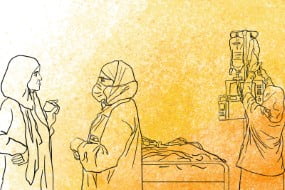End of Life Care: Challenges and Innovation
Explore dying and palliative care practice around the world and evaluate new trends and ideas surrounding end of life care issues.
Who is the course for?
This course is for people interested in or engaged in matters relating to death, dying, bereavement, palliative and end of life care.
This course will be of special interest to those working in healthcare, including physicians, nurses, social workers, and other health and social care professionals.
The course will also appeal to practitioners, students, researches, volunteers and policymakers in end of life care, as well as social activists and those working in artistic and cultural media who are working on end of life issues.
It is ideal for anybody considering the University of Glasgow’s MSc End of Life Studies
What topics will you cover?
Defining dying and end of life
‘Good’ and ‘bad’ dying
Hospital care at the end of life
How communities around the world are creating new ways to deliver palliative care for people with chronic and terminal illnesses – the example of Kerala, in India
How ‘compassionate communities’ are forming to work alongside service providers to meet the challenges of loneliness, isolation and the experience of ‘social death’ – the example of Clydebank, in Scotland
Examining the fast growing world-wide interest in the movement known as ‘Death Café’
Many people want to take direct control over how they die. Where is assisted dying legal and what are its implications – for the meaning of death, the practice of palliative care and the ‘right to choose’?
Rational suicide – an emerging response to the desire for direct control over the manner of one’s death, especially among older people
How modern individuals seek to ‘curate’ their dying process and the rituals that follow it
What will you achieve?
By the end of the course, you‘ll be able to…
Remember key elements and discussions in the end of life care challenges that are being faced around the world, including important metrics
Understand the implications of these issues, debates and metrics for policy making, service organisation, clinical practice and public involvement
Apply these understandings to specific situations with which learners will be presented in the course materials – through specific micro-case studies – and sharing their own experiences and ideas in discussion with others
Analyse current debates on end of life care in ways which lead to comparisons between different settings
Evaluate and make critical judgements based on research evidence about existing and new approaches to end of life care and potential solutions to problems identified
Create new scenarios for future end of life care based on an analysis of needs, conflicting debates, best practice and the potential for innovation
User Reviews
Be the first to review “End of Life Care: Challenges and Innovation”
You must be logged in to post a review.







There are no reviews yet.